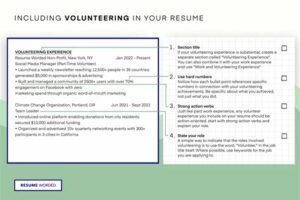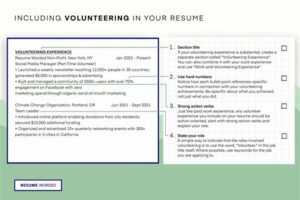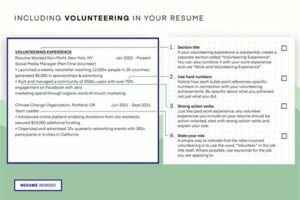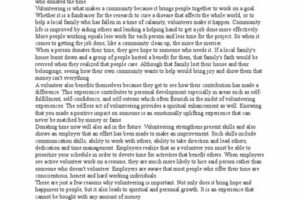Table of Contents
Looking to work as a volunteer? Discover the essential steps and tips on how to become a valued volunteer. Learn about finding the right organization, understanding your role, and making a positive impact. Get started on your rewarding journey of giving back and making a difference in the lives of others.
Volunteering is a powerful way to make a positive impact in your community and beyond. Whether you have a passion for helping the less fortunate, protecting the environment, or advocating for a cause close to your heart, working as a volunteer allows you to contribute your time and skills towards something meaningful. Moreover, volunteering not only benefits those in need but also offers countless personal and professional rewards. In this guide, we will explore the essential steps to becoming a successful volunteer, providing you with valuable insights and tips on how to navigate this fulfilling journey.
Introduction
Volunteering is a noble act that allows individuals to give back to their communities, contribute to causes they care about, and make a positive impact on society. Whether you have a few hours to spare or want to dedicate your time to a long-term commitment, working as a volunteer can be a fulfilling and rewarding experience. In this article, we will explore the steps to becoming a volunteer and provide tips on how to work effectively in a professional manner.
Finding the Right Cause
The first step in becoming a volunteer is to identify a cause that resonates with you. Consider your passions, interests, and values when selecting a cause. Whether it’s environmental conservation, animal welfare, education, or assisting the underprivileged, finding a cause you genuinely care about will ensure a more meaningful volunteering experience.
Researching Volunteer Opportunities
Once you have chosen a cause, start researching organizations and initiatives that align with your interests. Look for local nonprofits, community centers, or international organizations that operate in your area. Visit their websites, read about their missions, projects, and available volunteer opportunities. Take note of the skills or qualifications required for each opportunity to ensure a good fit.
Reach Out to Organizations
Once you have identified organizations that appeal to you, reach out to them to express your interest in volunteering. This can be done through email, phone calls, or even in-person visits. Introduce yourself, explain why you are interested in their cause, and inquire about available volunteer positions. Be professional, polite, and demonstrate your commitment to making a difference.
Attend Orientation and Training Programs
Many organizations require volunteers to undergo orientation and training programs to familiarize themselves with the organization’s policies, procedures, and goals. These programs may also provide specific training related to the volunteer role you will undertake. Attend these sessions attentively, ask questions, and take notes to ensure you understand your responsibilities and contribute effectively.
Establish Clear Commitments
Before officially starting as a volunteer, it is essential to establish clear commitments with the organization. Discuss the expected time commitment, duration of your volunteering, and any specific tasks or projects you will be working on. This clarity will help both you and the organization to manage expectations and make the most of your time and skills.
Adhere to Professionalism
Volunteering should be approached with professionalism, just like any paid job. Dress appropriately, arrive on time, and communicate effectively with fellow volunteers and staff members. Respect the organization’s rules and guidelines, maintain confidentiality when required, and always act in the best interest of the cause you are supporting.
Build Relationships with Fellow Volunteers
Volunteering often involves working closely with other individuals who share a passion for the same cause. Take the opportunity to build relationships and collaborate with fellow volunteers. Share ideas, support each other, and create a strong network within the organization. Building positive relationships not only enhances the volunteering experience but may also open doors to future opportunities.
Continuously Learn and Grow
Volunteering offers numerous learning opportunities. Be open to acquiring new skills and knowledge during your volunteer work. Seek feedback from supervisors or experienced volunteers, attend workshops or training sessions, and stay updated on the latest developments in the field. Embrace the chance to grow both personally and professionally through your volunteering experiences.
Express Gratitude
Lastly, always express gratitude to the organization and individuals who support your volunteering efforts. Thank the staff members, fellow volunteers, and any other individuals who contribute to making your experience meaningful. A simple thank-you note, a verbal appreciation, or even a small token of gratitude can go a long way in maintaining positive relationships and showing your genuine appreciation.
Conclusion
Working as a volunteer allows you to make a difference in the world while gaining valuable experiences. By finding the right cause, researching available opportunities, and approaching your volunteer work with professionalism, you can maximize your impact and create lasting change. Remember, the act of volunteering is not just about helping others but also about personal growth and fulfillment. Start your volunteering journey today and become a catalyst for positive change in your community!
Finding the right volunteer opportunity
To work as a volunteer, it is important to start by finding a cause or organization that aligns with your interests and values. Begin by researching different opportunities and reading reviews or testimonials to ensure that you choose a reputable organization. Consider factors such as the time commitment required, location, and any specific skills or qualifications needed for the role.
Submitting an application
Once you have identified a volunteer opportunity that interests you, take the next step by submitting an application form or reaching out to the organization expressing your interest. When submitting your application, provide a clear and concise summary of your skills, relevant experience, and reasons for wanting to volunteer. It can also be helpful to attach any necessary documents, such as a resume or reference letters, to support your application.
Attending an interview or orientation
If your application is successful, you may be invited for an interview or an orientation session. Treat this as a professional engagement and prepare by researching the organization beforehand. Show genuine enthusiasm and ask questions about the role, responsibilities, and expectations. This is also an opportunity for you to clarify any doubts or concerns you may have.
Understanding your role and responsibilities
Once you begin volunteering, it is crucial to have a clear understanding of your role and responsibilities. Take the time to clarify with the organization the specific tasks you will be assigned, the time commitment required, and any guidelines or protocols you need to follow. If necessary, ask for any training or resources that will help you carry out your duties effectively. Additionally, make sure you are aware of the organization’s policies and procedures.
Building a rapport with the team
Working collaboratively with the team is essential as a volunteer. Be friendly, respectful, and approachable towards fellow volunteers and staff members. Engage in open and effective communication, actively listen to others, and offer assistance whenever possible. Building positive relationships will contribute to a more enjoyable and productive volunteering experience.
Demonstrating commitment and reliability
Volunteering requires a commitment to the organization and the cause. Be punctual and reliable, honoring the agreed-upon schedule and fulfilling your responsibilities to the best of your abilities. If there are any changes or unexpected circumstances that may affect your availability, notify the organization well in advance. Demonstrating dedication and reliability will make you a valued member of the volunteer team.
Embracing a flexible and adaptable mindset
Volunteer work often involves encountering unexpected situations or challenges. Approach these situations with a flexible and adaptable mindset, willing to adjust and find solutions. Be open to learning new skills or stepping out of your comfort zone, as this demonstrates your willingness to grow and contribute effectively to the organization.
Reflecting on your experience and providing feedback
After completing your volunteer work, take the time to reflect on your experience. Consider the skills you have gained, the impact you have made, and any areas for personal or professional development. Providing feedback to the organization is also important, as it can help enhance the volunteering experience for future volunteers. Share your thoughts on the volunteer program and any suggestions for improvement.
As a professional who values the importance of giving back to the community, I understand the significance of working as a volunteer. Engaging in volunteer work not only benefits the causes and organizations we support but also enables personal growth and development. In order to effectively work as a volunteer, it is essential to follow a few key guidelines:
1. Identify your passion and interests: Start by identifying the causes or organizations that align with your values and interests. This will ensure that you are motivated and engaged in the work you are doing, making your volunteer experience more meaningful.
2. Research and choose the right organization: Conduct thorough research on different organizations that focus on your chosen cause. Look for established and reputable organizations that have a clear mission and positive track record.
3. Reach out and express your interest: Once you have identified the organization you would like to volunteer for, reach out to them directly. Express your interest in volunteering and inquire about any specific requirements or application processes they may have.
4. Attend orientation and training sessions: Many organizations provide orientation and training sessions to familiarize volunteers with their work, policies, and procedures. Make sure to attend these sessions to gain a better understanding of your role and responsibilities.
5. Be reliable and committed: Treat your volunteer work as you would a professional job. Be punctual, reliable, and committed to fulfilling your duties. Organizations rely on volunteers to support their operations, and your dedication is crucial to their success.
6. Communicate effectively: Maintain open and transparent communication with the organization and fellow volunteers. If you have any questions, concerns, or ideas, don’t hesitate to share them. Effective communication fosters collaboration and ensures a positive working environment.
7. Respect confidentiality and boundaries: Many organizations deal with sensitive information or work with vulnerable populations. It is imperative to respect confidentiality agreements and maintain appropriate boundaries to protect the privacy and well-being of those you are serving.
8. Seek feedback and continuous improvement: Reflect on your volunteer experiences and seek feedback from both the organization and fellow volunteers. Use this feedback constructively to improve your skills, knowledge, and effectiveness as a volunteer.
9. Network and build relationships: Take advantage of the opportunities to network and build relationships with other volunteers, staff, and community members. These connections can lead to future collaborations and expand your professional network.
10. Express gratitude and appreciation: Finally, always express gratitude and appreciation to the organization, staff, and fellow volunteers for the opportunity to contribute. A simple thank you can go a long way in fostering positive relationships and demonstrating your professionalism.
By following these guidelines and approaching your volunteer work with a professional voice and tone, you can make a significant impact while also benefiting personally from the experience. Remember, volunteering is not just about giving; it is also about personal growth, learning, and building a sense of community.
Thank you for taking the time to visit our blog and learn about how to work as a volunteer. We hope that this article has provided you with valuable insights and practical tips on how to make a positive impact in your community or abroad. Volunteering is not only a rewarding experience but also an opportunity to develop new skills, meet like-minded individuals, and contribute to causes that are close to your heart.
As you embark on your volunteering journey, it is important to approach it with a professional mindset and tone. Although volunteering may not come with a formal job title, it is crucial to treat it as a professional commitment. By doing so, you will not only maximize your own personal growth but also ensure that you are making a meaningful difference in the lives of those you are serving.
One key aspect of working as a volunteer is maintaining a professional voice and tone. This means communicating clearly, respectfully, and effectively with all stakeholders involved, whether it be fellow volunteers, project coordinators, or the community members you are assisting. Remember to use proper language and avoid slang or informal expressions, as this can undermine the professionalism of your work.
Additionally, it is essential to approach your volunteer work with a sense of dedication and reliability. Treat your commitments seriously, showing up on time and completing tasks to the best of your ability. By demonstrating your reliability, you will gain the trust and respect of both your fellow volunteers and the organization you are supporting. This can potentially open doors for future opportunities and recommendations.
In conclusion, working as a volunteer offers a unique chance to give back to society and create a positive impact. By approaching your volunteer work with a professional voice and tone, you can ensure that you are making a meaningful difference and maximizing your personal growth. Remember to communicate respectfully, maintain reliability, and treat your volunteer commitments with the same level of dedication as you would a professional job. We hope that this article has provided you with the guidance you need to embark on your volunteering journey successfully. Best of luck!
.
Here are some common questions that people also ask about how to work as a volunteer:
What qualifications do I need to work as a volunteer?
To work as a volunteer, you typically do not need specific qualifications. However, certain volunteer roles may require specific skills or certifications. It is important to carefully read the requirements of each volunteer opportunity to determine if any qualifications are necessary.
How can I find volunteer opportunities near me?
There are several ways to find volunteer opportunities near you. You can start by contacting local non-profit organizations, community centers, or schools. Additionally, many websites and online platforms specialize in connecting volunteers with organizations in need. Some popular platforms include VolunteerMatch, Idealist, and HandsOn Network.
What are the benefits of volunteering?
Volunteering offers numerous benefits, both personal and professional. It allows you to give back to your community, make a positive impact, and develop new skills. Volunteering also provides an opportunity to network and connect with like-minded individuals who share similar interests.
How much time do I need to commit as a volunteer?
The time commitment required as a volunteer varies depending on the organization and role. Some volunteer opportunities may require just a few hours per week, while others may require a more substantial commitment. It is important to discuss your availability and commitments with the organization before committing to a volunteer position.
Can I volunteer if I have a full-time job?
Absolutely! Many volunteer opportunities offer flexible schedules to accommodate individuals with full-time jobs. You can discuss your availability and time constraints with the organization to find a volunteer role that suits your needs.
Do volunteers receive any training?
Volunteers may receive training depending on the nature of the volunteer role. Some organizations provide orientation sessions or specific training programs to ensure volunteers are adequately prepared for their tasks. It is important to inquire about the training opportunities available when applying for a volunteer position.
Can volunteering lead to paid employment?
While there is no guarantee that volunteering will directly lead to paid employment, it can certainly enhance your skills, network, and experience. Volunteering allows you to develop new abilities and demonstrate your commitment to a cause or organization, which can be valuable when seeking future employment opportunities.
Remember, volunteering is a rewarding experience that allows you to make a positive impact while learning and growing personally and professionally.






